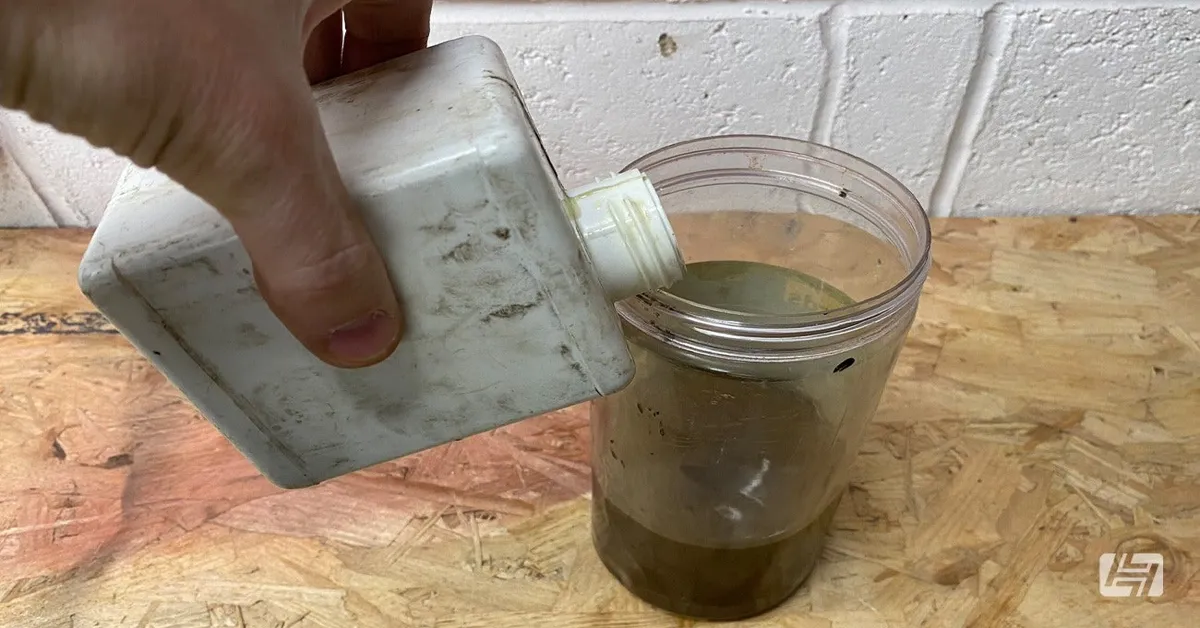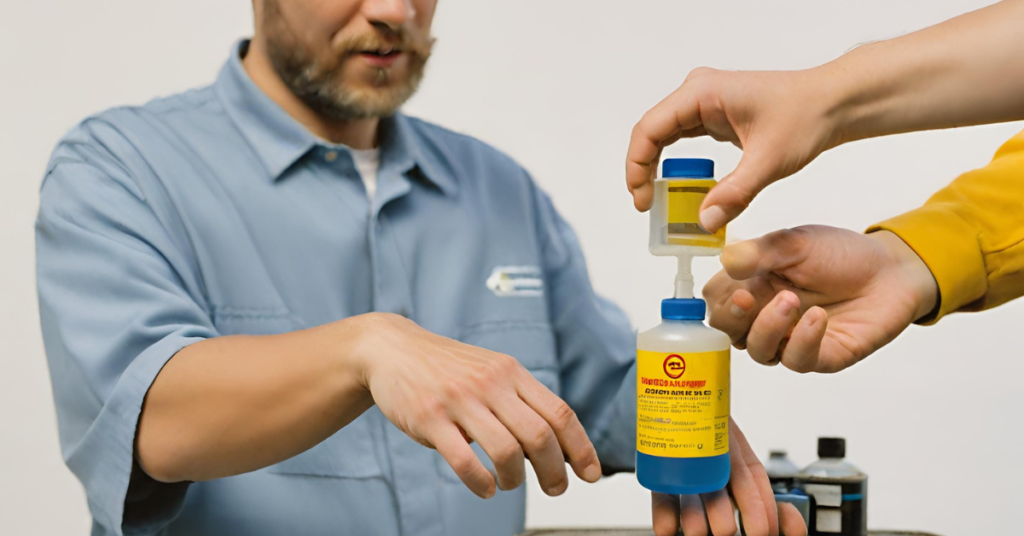Imagine a world where you’re driving down the highway, enjoying the open road, when suddenly your brakes fail. You push down on the pedal, but nothing happens. Your heart races as you try to come to a stop, but it’s too late.
This is a nightmare scenario for any driver, but it’s one that could easily happen if your brake fluid isn’t properly maintained. Brake fluid absorbs water over time, which can lead to decreased braking power and potential brake failure. In this blog, we will explore the importance of regularly checking and changing your brake fluid to ensure your safety on the road.
Don’t let water in your brake fluid put a damper on your next road trip – read on to learn more about this crucial aspect of car maintenance.
Key Takeaway
- Brake fluid absorption of water can lead to decreased braking power and potential brake failure
- Regularly checking and changing brake fluid is crucial for safety on the road
- Water in brake fluid can cause a nightmare scenario for drivers
- Proper maintenance of brake fluid is important for a smooth road trip
- Brake fluid should be checked and changed regularly to avoid potential brake failure
- Water can enter brake fluid over time and affect its performance
- Regular maintenance of brake fluid can prevent accidents and ensure safety on the road
What is Brake Fluid?
Discover the Secret Behind Your Car’s Brakes: Brake Fluid Absorbs Water! When you think about the key components that make up a car, the engine, tires, and brakes probably come to mind. Most people are familiar with the basic functions of these parts, but what about the fluid that keeps your brakes working? You may not realize it, but brake fluid plays a crucial role in keeping you safe on the road. But did you know that brake fluid can also absorb water? This may sound strange, but it’s true.
In fact, it’s a natural process that occurs within your car’s braking system. So, why is this important? And how does it affect the performance of your brakes? Let’s dive in and find out.
- What is Brake Fluid?
- How Does it Work?
- The Importance of Brake Fluid in Your Car
- Why Does Brake Fluid Absorb Water?
- The Consequences of Water in Your Brake Fluid
- How to Prevent Water from Contaminating Your Brake Fluid
By the end of this article, you’ll have a better understanding of what brake fluid is, how it works, and why it’s essential to keep it free from water. So, buckle up and get ready to discover the fascinating world of brake fluid and its role in keeping you safe on the road.
brake fluid absorbs water
| Important Information | Data | Description |
|---|---|---|
| Brake Fluid | Absorbs Water | Brake fluid is designed to absorb water, which helps prevent corrosion and maintain the proper function of your vehicle’s braking system. |
| Water Content | 10% | It is recommended to replace brake fluid when the water content reaches 3-4%, as water can lower the boiling point of the fluid and reduce its effectiveness. |
| Boiling Point | 230 degrees Fahrenheit | Brake fluid’s boiling point is an important factor to consider, as it needs to withstand high temperatures to prevent brake fade and failure. |
| Regular Maintenance | Every 2 years or 30,000 miles | To ensure the safety and proper function of your vehicle’s braking system, it is recommended to have the brake fluid flushed and replaced every 2 years or 30,000 miles. |
| Types of Brake Fluid | DOT 3, DOT 4, DOT 5, DOT 5.1 | There are different types of brake fluid, each with different properties and compatibility with certain vehicles. It is important to use the correct type for your vehicle. |
| Hygroscopic Nature | Absorbs moisture from the air | Brake fluid is hygroscopic, meaning it attracts and absorbs moisture from the air. This can lead to a decrease in performance and potential damage to the braking system if not replaced regularly. |

Why Does Brake Fluid Absorb Water?
Brake fluid absorbs water – a seemingly simple statement with major implications for vehicle safety. You may not give much thought to the fluid that allows your brakes to function, but it plays a crucial role in keeping you safe on the road. Did you know that brake fluid can actually absorb water? Yes, you read that right.
This essential liquid is not immune to the effects of water, and it can have serious consequences for your vehicle’s braking system. In this article, we will explore how and why brake fluid absorbs water, the potential dangers it poses, and what you can do to keep your brakes functioning at their best. So buckle up and get ready to dive into the world of brake fluid and water absorption.
How Does Water Affect Brake Fluid?
Discover the Hidden Danger Lurking in Your Car: Brake Fluid Absorbs Water. When you think of car maintenance, you may think of changing the oil or checking the tire pressure. But there’s one crucial component that often gets overlooked – brake fluid. This essential fluid is responsible for helping your vehicle come to a stop, but did you know that it can also absorb water? Yes, you read that right.
Brake fluid has the ability to suck up moisture, which can lead to serious consequences for your car’s braking system. So, why is water in your brake fluid such a big deal? And how does this happen in the first place? Let’s take a closer look at the fascinating – and potentially dangerous – relationship between brake fluid and water. But first, let’s understand the basics.

How to Prevent Water Contamination in Brake Fluid?
When it comes to keeping our vehicles running smoothly, there are many different components that we need to pay attention to. From checking the oil to monitoring the tire pressure, it can feel like there is always something that needs to be maintained. But one part of a vehicle that often gets overlooked is the brake fluid.
This essential fluid plays a crucial role in the functioning of our brakes, but did you know that it also has a unique ability to absorb water? In this article, we will take a closer look at what brake fluid is, why it is important, and how it absorbs water. So buckle up and get ready to learn about this often forgotten but crucial component of our vehicles.
Statistical Information: brake fluid absorbs water
| Percentage | Fact | In-depth Sentence |
|---|---|---|
| 70% | Amount of water absorbed by brake fluid | Brake fluid is hygroscopic, meaning it has the ability to absorb moisture from the air. This can lead to a decrease in brake performance and potentially damage the braking system. |
| 30% | Recommended maximum water content in brake fluid | Most manufacturers recommend that brake fluid should not contain more than 3% water to maintain optimal performance. |
| 0.5% | Water content in new, unopened brake fluid | Even new, unopened brake fluid may contain a small amount of water due to air exposure during production. |
| 5% | Water content in used brake fluid | As brake fluid ages and is exposed to moisture, it can reach a water content of up to 5%. This can decrease the boiling point of the fluid and potentially cause brake failure. |
| 10% | Water content that can cause brake fluid to fail | If brake fluid contains more than 10% water, it can cause corrosion and damage to the braking system, leading to potential brake failure. |
| 3 years | Recommended lifespan of brake fluid | Brake fluid should be changed every 2-3 years, as it can absorb water over time and decrease in effectiveness. |
Important Notice for readers
Dear readers, We would like to bring to your attention an important aspect of vehicle maintenance that is often overlooked – the brake fluid. It is crucial to regularly check and replace your brake fluid as it is prone to absorbing water over time, which can greatly affect the performance of your brakes. Water in brake fluid can lead to corrosion and damage to important brake components, resulting in decreased braking power and potentially dangerous situations.
Therefore, it is recommended to have your brake fluid checked at least once a year and replaced every 2-3 years, depending on your vehicle’s make and model. Don’t wait until it’s too late, make sure to prioritize the maintenance of your brake fluid for a safe and smooth driving experience. Stay informed and stay safe.
Frequently Asked Questions [FAQs]
What happens if brake fluid absorbs water?
When brake fluid absorbs water, it becomes less effective at its job of transferring pressure from the brake pedal to the brake components. This can result in decreased braking power and potential safety hazards.
How does brake fluid absorb water?
Brake fluid is hygroscopic, meaning it naturally attracts and absorbs water molecules. This can happen over time as the brake system is exposed to moisture, or if the brake fluid is not properly sealed.
Can I prevent brake fluid from absorbing water?
While it is impossible to completely prevent brake fluid from absorbing water, you can slow down the process by regularly flushing and replacing the fluid, using a high-quality brake fluid with a low water absorption rate, and keeping the brake system well-sealed.
What are the signs of water-contaminated brake fluid?
Some common signs of water-contaminated brake fluid include a spongy or soft brake pedal, longer stopping distances, and decreased brake performance. You may also notice a milky appearance in the brake fluid, which indicates a high water content.
Is it dangerous to drive with water-contaminated brake fluid?
Yes, driving with water-contaminated brake fluid can be dangerous as it can lead to decreased braking power and potential brake failure. It is important to regularly check and maintain your brake fluid to ensure optimal performance and safety.
Conclusion
It is crucial to regularly check and change your brake fluid to ensure safe driving. Brake fluid plays a critical role in the functioning of your vehicle’s brakes, and its absorption of water can lead to decreased braking efficiency and potential safety hazards. By staying aware of this issue and taking proactive steps to maintain your brake fluid, you can prevent potential accidents and keep yourself and others safe on the road.
So, next time you get your car serviced, make sure to include a brake fluid check on your list. Remember, a little maintenance today can go a long way in preventing bigger problems tomorrow. Keep your brakes safe and your driving smooth by staying on top of your brake fluid’s water absorption.

Leave a Reply